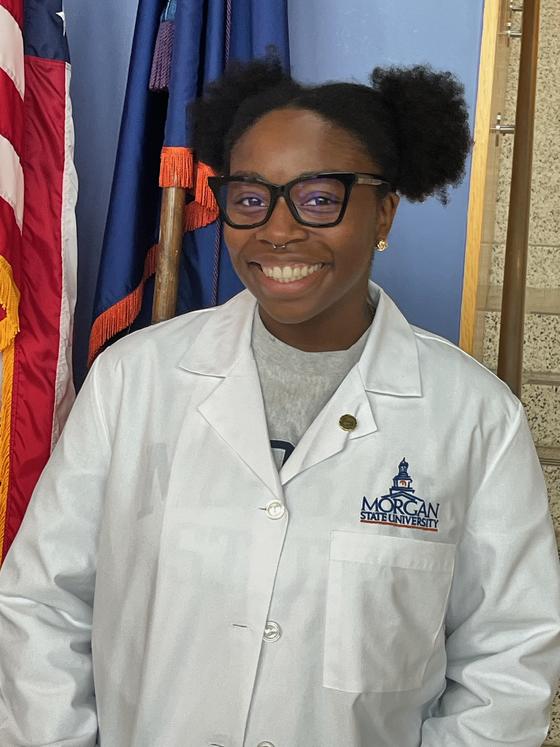Career Outlook
The Bureau of Labor Statistics projects 11% growth for nutritionist and dietitian jobs by 2030, faster than the national average.

The dietetics track combines graduate coursework with 1,000 hours of supervised experiential learning to prepare you to become a registered dietitian nutritionist (RDN).
Tuition & Fees
Funding Opportunities
Preceptor Resources
Program at a Glance
Hood’s Graduate Program in Nutrition and Dietetics is designed to prepare students for future careers as Registered Dietitian Nutritionists (RDNs) in a wide variety of practice settings. This Future Education Model Graduate Program seamlessly combines 42 credits of didactic coursework with over 1100 hours of supervised experiential learning (SEL) in a competency-based curriculum. Our program provides a foundation in clinical nutrition, public health principles and programs, health communications, nutrition research, leadership, and sustainability.
Graduates are provided with the skills, knowledge and experience needed to become Registered Dietitian Nutritionists able to practice in diverse work settings. Of note, students are not required to arrange their own SEL experiences. All rotations are carefully planned and coordinated by the Program to ensure diverse and quality training opportunities in professional settings. The dietetics track offers full and part-time options with a structured sequence of courses. Coursework covers topics such as public health nutrition, clinical nutrition, food service management and more.
Degree Granted
Students who fulfill all program graduation requirements will be granted the degree of a Master of Science in Nutrition, and a Verification Statement, which qualifies them to sit for the Registration Examination for Dietitians, administered by the Commission on Dietetic Registration (CDR). Upon passing the CDR exam, graduates will also be eligible to apply for licensure as a Registered Dietitian in the state of Maryland. For more information, please visit Maryland Department of Health Board of Dietetics.
Accreditation
The Hood College Graduate Program in Nutrition and Dietetics is fully accredited by the Accreditation Council for Education in Nutrition and Dietetics (ACEND) as a graduate program (GP). ACEND is the Academy of Nutrition and Dietetics' accrediting agency for education programs preparing students for professional credentials in nutrition and dietetics. Specialty accreditation is necessary to assure that the education and training received by students meets quality standards and to guarantee that students from any accredited program have been taught the same foundational knowledge requirements. ACEND can be reached with the below contact information.
HOOD Talks Lecture Series
Professor Eaton recently presented at Hood College's HOOD Talks lecture series on 'Mindful and Intuitive Eating.' Click here to see a record of her lecture.
We are now on DICAS! Interested applicants for the Fall 2026 semester can apply via our DICAS application portal. Click here to start your application today.
| Basic Science Courses: | Nutrition and Math Courses: |
| Chemistry (4 credits) | Food Preparation or Food Science with lab (4 credits) |
| Organic Chemistry (4 credits) | Introduction to Nutrition or Basic Nutrition Course (3 credits) |
| Biochemistry (3 credits) | Human Metabolism (3 credits) |
| Microbiology (3 credits) | Statistics or Biostatistics (3 credits) |
| Anatomy and Physiology (8 credits) |
ACEND requires a minimum of 1,000 hours of supervised experiential learning with a minimum of 700 hours in professional work settings. Supervised experiential learning is provided throughout the curriculum via case studies, simulation, service learning, a graduate research capstone and other course projects.
In the last three terms of the program, students take dietetics practicum courses and are placed at various professional work settings for supervised experiential learning (SEL) in food service management, community nutrition, wellness and clinical sites. The major focus of the SEL rotations is clinical. Sites include acute care, outpatient, long-term care and clinical specialties, such renal, diabetes and eating disorders. Typically, students will be at their SEL site from Tuesday through Friday with Mondays reserved for classes.
Students who complete each of the following requirements will earn a Master’s of Science and be granted a verification statement that will allow them to take the CDR registration examination to become an RDN.
The didactic courses of the graduate program follow the academic calendar of Hood College. However, due to scheduling and availability of preceptors, it may be necessary for some students to complete supervised experiential learning hours during academic breaks. When students are placed at supervised experiential learning sites for nutrition practicum courses, of the program, they will observe the working hours and calendar of the preceptor with whom they are placed, which may differ from Hood’s academic calendar.
Click here for the current academic calendar.
As fully matriculated graduate students, you may defer payment on undergraduate student loans and apply for financial aid through the Hood College Office of Financial Aid. For more information on funding your graduate education, click here.
The dietetics track offers full and part-time options with a structured sequence of courses. You will complete a total of 42 credits with a minimum of 1,000 supervised experiential learning hours.
Program Schedule:
The dietetics track offers full and part-time options with a structured sequence of courses. Our unique program integrates supervised experiential learning hours throughout coursework in the first year, and provides students with full-time (32 hrs/week) SEL rotations in the second year. Didactic courses are offered Monday through Thursday in the afternoons and evenings during the first year. During the second year, classes are on Mondays, while SEL rotations typically run from Tuesday through Friday. Most courses are offered in a hybrid format, with in-person and online sessions. Please note that students are required to have reliable internet service and webcam access for online sessions.
See below for a detailed overview of full-time and part-time program options:
Prior Learning Assessment Policy
The Nutrition Program accepts up to 6 credits of prior learning experience towards degree completion for applicable graduate classes taken within the past 5 years with a grade of B or higher. To receive credit, students need to provide all requested supporting documentation to the program director, which may include transcripts, course syllabi and graded assignments.
To prepare competent entry-level Registered Dietitian Nutritionists (RDNs) to be culturally sensitive practitioners who use an evidence-based approach to practice and promote the health and wellness of individuals and families who make up the diverse global community.
Goal #1: Program graduates will be competent entry-level Registered Dietitian Nutritionists who are culturally sensitive and provide health and nutrition services to diverse communities.
Goal #2: Program graduates will use an evidence-based approach to deliver nutrition services in the community.
Program Objectives for Goal #1
Program Objectives for Goal #2
Program outcomes data are available upon request.
Becoming a Registered Dietitian Nutritionist (RDN)
To become an RDN, you will need to:
More information on how to become a Registered Dietitian can be found here.
Is this flexible for working professionals?
Yes. The program offers part-time and full-time programs of study. During the first year, most classes are in the evenings, and we offer hybrid learning formats for didactic courses to accommodate busy schedules and minimize commuting. Many students continue part-time work or family responsibilities while completing the program. During the second year, classes are on Mondays, with Tuesday through Friday reserved for supervised experiential learning (SEL) hours in professional settings. Our faculty and program director will work with you to plan a manageable path to graduation.
What do SEL Rotations look like?
Supervised Experiential Learning (SEL) rotations at Hood College are designed to give you real-world experience across the core areas of dietetics: clinical nutrition, community nutrition, and food service management. You will complete approximately 800 hours of supervised practice under the mentorship of experienced preceptors in a variety of professional settings and approximately 200 hours of alternate SEL hours on campus through simulations, case-based learning and applied projects.
Clinical Rotations take place in hospitals, long-term care facilities, and outpatient clinics, where you’ll assess patients, develop care plans, and provide medical nutrition therapy, nutrition counseling and education to patients with a variety of nutrition concerns. Students on average complete 15-18 weeks of clinical rotations.
Community Nutrition Rotations are approximately 6 weeks and may include public health departments, non-profits, or school-based programs. You'll engage in nutrition education, health promotion, food access initiatives, and population health assessments—making a direct impact in the community.
Food Service Management Rotations are approximately 5 weeks and are completed in healthcare institutions, schools, or commercial food operations. You'll gain experience in food safety, production, budgeting, quality improvement initiatives, and other management functions.
You may also complete elective rotations in specialized areas such as sports nutrition, eating disorders, private practice, or research, depending on your interests and career goals.
Will I have support during and after the program? Absolutely! Students receive personalized academic advising, career coaching, and mentorship throughout the program. Our strong preceptor network and career support services continue after graduation, helping you connect with job opportunities and stay engaged with our professional community.
Is this program accredited?
The Hood College Graduate Program in Nutrition and Dietetics is fully accredited by the Accreditation Council for Education in Nutrition and Dietetics (ACEND) as a graduate program (GP). ACEND is the Academy of Nutrition and Dietetics' accrediting agency for education programs preparing students for professional credentials in nutrition and dietetics. Specialty accreditation is necessary to assure that the education and training received by students meets quality standards and to guarantee that students from any accredited program have been taught the same foundational knowledge requirements. ACEND can be reached with the below contact information.
The Bureau of Labor Statistics projects 11% growth for nutritionist and dietitian jobs by 2030, faster than the national average.
Our Accreditation Council for Education in Nutrition and Dietetics (ACEND) accredited program equips you with expert training as prioritized by the Academy of Nutrition and Dietetics and the American Society of Nutrition.
Frederick Health, Frederick County Public Schools, Adventist HealthCare and Kaiser Permanente are among numerous regional organizations that actively recruit dietitians and nutritionists.
| Median Salary (Public Data) | Job Titles | Companies of Employment |
|---|---|---|
| $79,000 | Registered Dietitian Nutritionist (RDN) | Frederick Health Hospital |
| Clinical Dietitian | National Institutes of Health (NIH) | |
| Nutrition Research Associate | Frederick County Public Schools | |
| Health & Wellness Consultant | WIC (Women, Infants, and Children Program) | |
| Nutrition Educator | Food and Drug Administration (FDA) |
Nutrition Science majors have been found to have lowest unemployment rates for any major among recent graduates. Click here to learn more about the employment outcomes for recent Nutrition graduates by clicking here.

Program Director, Nutrition Science

Assistant Director of Graduate Admission

Dietetic Program Coordinator, Nutrition Science

"I was drawn to Hood College for its strong emphasis on community, which creates an environment where I know I’ll thrive."

"Our cohort is a little family, and the connections I made with them and with the Hood community are the most meaningful part of the journey thus far."

New graduate program in nutrition science is poised to train registered dietitian nutritionists (RDNs) and more.